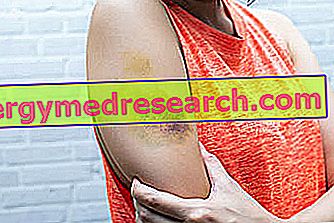Generality
The therapeutic abortion is the abortion carried out through medical interventions in order to preserve the health of the mother or to avoid the development of a fetus suffering from serious pathologies or malformations.

More in detail, therapeutic abortion represents a voluntary interruption of pregnancy that can be carried out even after the 90 days of gestation provided for by the current legislation (law 194/1978).
Therapeutic abortion can be performed by medication or by surgery. The choice to carry out one type of treatment rather than another depends essentially on the week of gestation in which the woman finds herself, on the presence of any allergies to drugs, on the reason why it is necessary to practice the interruption of pregnancy, etc.
Although medical treatments put in place to perform therapeutic abortion are generally considered safe, it is important to point out that the development of possible complications increases as pregnancy progresses.
What is that
What is Therapeutic Abortion?
As mentioned, therapeutic abortion is the voluntary interruption of pregnancy that is carried out for medical reasons . More in detail, there is talk of therapeutic abortion if the gestation is interrupted due to the presence of real and serious risks for life and / or for maternal psychophysical health attributable to the continuation or termination of the pregnancy itself.
When practicing
When can you practice Abortion Therapeutic?
The execution of abortion in Italy is regulated by law 194/1978 . This law allows the voluntary interruption of pregnancy within ninety days for reasons that are also different from the protection of women's health (for example, for economic reasons - when the mother is not able to provide for the maintenance of the unborn child - for social reasons, for reasons family, etc.). After the ninety days of gestation, however, abortion is allowed only if therapeutic.
In other words, therapeutic abortion can take place both within and after the first ninety days, provided that there are serious medical conditions that justify its execution. These conditions are expressly set out in article 6 of law 194 which states that abortion can be practiced after the ninety-day deadline only if:
- Continuation of pregnancy and / or childbirth constitute a serious and effective danger to a woman's life;
- The presence of pathological processes - including those relating to significant anomalies or malformations of the unborn child - was ascertained, capable of determining a serious danger to the physical or mental health of the woman.
Practical examples of cases in which it is possible to resort to therapeutic abortion
In order to proceed with the execution of therapeutic abortion, it is necessary that the serious medical conditions for which this act represents the only solution are ascertained by a doctor .
The main medical conditions concerning the mother that can lead to the execution of a therapeutic abortion are represented by:
- Severe cardiovascular diseases ;
- Serious kidney disease ;
- Some types of malignant tumors, such as breast cancer, cervical cancer, lymphoma, leukemia, melanoma, cancer of the stomach and lungs, especially if they have metastasized reaching the placenta and the fetus.
Among the serious medical conditions that can affect the fetus and induce the doctor to opt for a therapeutic abortion, we find instead:
- Chromosomal disorders and abnormalities ;
- Neurological defects ;
- Malformations ;
- Metabolic disorders .
Finally, it should be noted that therapeutic abortion can also be practiced in the presence of multi-fetal pregnancies that can cause the death or delayed development of fetuses.
Procedure
How is Therapeutic Abortion Performed?
The procedure for therapeutic abortion - especially when it must be practiced beyond the ninety days of gestation - requires that specific medical investigations are carried out in order to determine whether the criteria for proceeding with the termination of the pregnancy are met.
Once the doctor has consented to the execution of the abortion, this can be performed by pharmacological treatment or by surgical treatment . Although even women can have a say in the choice of the method to terminate the pregnancy (when possible, some women prefer to resort to pharmacological abortion, while others prefer the surgical procedure), the use of one type of treatment rather than another depends on a number of different factors, such as:
- The progress of pregnancy ;
- The presence of contraindications to the execution of a specific type of abortion, be it pharmacological or surgical;
- The presence of allergies to one or more of the drugs that must be administered during the procedure for the termination of pregnancy (anesthetics for surgical treatment, abortives and prostaglandin analogues for pharmacological abortion).
The task of the doctor, therefore - after confirming the presence of conditions for which it is necessary to intervene with therapeutic abortion - is to exclude the presence of any contraindications to the execution of the pharmacological treatment rather than surgical treatment and vice versa, taking into account at the same time, the needs of the patient.
Clearly, the situation changes if an urgency should arise and the patient's life is in a state of imminent danger. In such a situation, in fact, it will be the doctor who decides what to do, proceeding with hospitalization and putting into practice the procedure that he considers most suitable to safeguard the life of his patient.
Pharmacological-type therapeutic abortion
Pharmacological-type therapeutic abortion requires that pregnancy termination be performed by administering specific drugs.
Since it is a pharmacological abortion in all respects, it must be performed within the first 7-9 weeks, calculated starting from the first day of the last menstrual cycle. If the pregnancy is at a more advanced stage, it is necessary to proceed with surgical treatment.
However, therapeutic pharmacological abortion involves the administration of:
- An abortion drug, that is, the so-called abortion pill, RU486, containing the active ingredient mifepristone . This active ingredient counteracts the action of progesterone - essential in the early stages of pregnancy - and causes the detachment of the embryonic sac.
- A prostaglandin analogue . Generally, misoprostol is used, but gemeprost can also be used. This drug is administered 36-48 hours after the abortive drug and has the task of inducing contractions to allow the expulsion of the contents of the uterus.
For more information, see the dedicated article: Pharmacological Abortion.
Surgical-type Abortion
When the pregnancy is at a stage that does not allow the use of the abortion pill, or when the pharmacological abortion cannot be practiced for other reasons (presence of allergies or contraindications to the use of the necessary drugs), it is possible to resort to surgery and to the so-called instrumental emptying of the uterus . More in detail, the methods used are aspiration (also known as " Karman method ") and curettage .
Both of these surgical treatments can be performed in day hospital ; hospitalization is usually done only in the presence of particularly serious complications or conditions of the woman. Anesthesia can be local or general, depending on the case.
After having dilated the cervix through the use of appropriate instruments, or through the administration of suitable drugs (such as prostaglandicin analogues, but in some cases it is also possible to use mifepristone), it is possible to proceed with the operation.
If aspiration is practiced, therapeutic abortion is performed by aspirating the contents of the uterus through a special cannula . Curettage, on the other hand, involves the use of a specific cutting tool in the form of a spoon known as " curette " or "curette", thanks to which it is possible to gently scrape the lining of the uterus in order to remove the product of conception.
Regardless of the type of therapeutic abortion performed - pharmacological or surgical - the outcome is confirmed 14-15 days after treatment by performing an ultrasound and / or specific blood analysis.
Side effects
The side effects that can occur following a therapeutic abortion may vary depending on various factors, such as the serious medical conditions that made abortion necessary, the type of treatment performed to interrupt the pregnancy, the type of administered drugs and so on.
Side Effects of Pharmacological Therapeutic Abortion
The main side effects that may occur following a pharmacological type of abortion are mainly due to the drugs administered to perform it. Among these, we recall:
- Ache;
- Nausea, vomiting and diarrhea;
- Vaginal bleeding which, in some cases, may persist even for several days after treatment;
- Headache;
- Gastrointestinal cramps.
Side Effects of Surgical Surgical Abortion
Among the side effects deriving from the execution of a surgical type of surgical abortion we find without a doubt the pain - whose intensity can be different from woman to woman - and the slight blood loss that could last for 4-5 days after surgery.
Not to be forgotten also the possible side effects due to a possible general anesthesia, among which we remember the most common: nausea, vomiting and drowsiness.
Complications
Possible Complications of Therapeutic Abortion
The main complications that could occur following a therapeutic abortion are:
- Metritis;
- Pelvic inflammatory disease;
- Infections (most likely to occur when the uterus has not been completely emptied, but residues are present).
Furthermore, therapeutic surgical abortion - especially by scraping - if not performed correctly (for example, removal of an excessive portion of endometrium and induction of damage and injury - including perforation - of the uterus), can lead to the appearance of secondary infertility .
Please note
In order to prevent complications, it is very important that the patient respects the indications provided by the doctor about the behaviors to be followed after performing the therapeutic abortion. Usually, the woman is advised to adopt an accurate intimate hygiene and to avoid sexual intercourse for at least forty days . If this is not the case, it is possible to develop vaginitis which - if neglected - can develop into pelvic inflammatory disease . The latter can, in turn, lead to the appearance of serious complications such as infertility .
Psychological Complications
The possible psychological complications that an abortion - albeit therapeutic and necessary - can cause to the woman should not be underestimated.

Indeed, such an experience can have devastating repercussions on the patient's psyche . In fact, it is not uncommon for it to develop extremely negative feelings and feelings: feelings of guilt, frustration, a sense of inadequacy and inability to continue the pregnancy, in particular, when this has been strongly desired. Under such conditions, the step towards the onset of real psychiatric disorders, such as depression, suicidal tendencies, anxiety and psychosis, is very short.
For this reason, the support, understanding and support of the partner, the family and the same healthcare staff is fundamental when a woman has to undergo a therapeutic abortion. Should this not be sufficient, it is advisable to turn to specialist doctors who will be able to provide the patient with the support and care they need.



